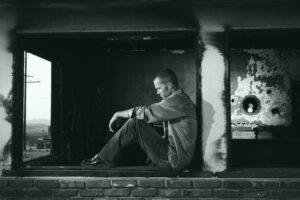Sometimes asking for help when we’re feeling depressed or anxious is just too hard. Sometimes we need others to come to us.

There have been 2 high profile individuals die by suicide recently. It was news that shocked many because it was not publicly known that Kate Spade and Anthony Bourdain were struggling to such an extent. There was a similar reaction when Robin Williams died too. In the aftermath of each of these deaths more information was shared that gave an insight into their struggles with health concerns, depression and anxiety. Each of the articles linked to have some of this extra information included.
There have been a variety of reactions on social media and in various blogs and articles. I shared one woman’s response to Kate Spades death on facebook and an article about how we might respond in a more helpful way to someone’s struggles.
And this week I’ve been involved in a discussion in a closed Facebook group about mental health concerns. One of the groups aims is to reduce the stigma around mental health and to support others in seeking help and to be there for others when they might struggle; it is a supportive and non-judgemental group and I feel privileged to be a member. One man shared his struggles with anxiety and depression and this prompted others to open up about their struggles too. There was also some discussion around what’s helpful when we might be struggling. The suggestions echoed what was written by the author of the article I shared above.
Reach out… ask for help…
 When we can’t lift a heavy box we ask someone if they can help us lift it. When we want to learn something new we enrol in a course or google instructions or search for a YouTube video showing us what to do. When we can’t do something on our own we ask someone for help. When we are feeling sick we seek help, from a doctor, pharmacist, or other allied health professional.
When we can’t lift a heavy box we ask someone if they can help us lift it. When we want to learn something new we enrol in a course or google instructions or search for a YouTube video showing us what to do. When we can’t do something on our own we ask someone for help. When we are feeling sick we seek help, from a doctor, pharmacist, or other allied health professional.
But when we are struggling mentally it can be really hard to ask for help. Because sometimes we might think that telling someone your struggling (sad, worried, stressed, scared, not coping) means you’re weak or not good enough, or maybe we fear that they might not want to know/help/be there, or maybe we feel so awful that we fear they might not be able to help. Or maybe we’re so consumed by what we feel that actually saying something to someone else is just too hard, the feelings are too overwhelming, we don’t have words, or we just don’t know what we feel or why.
In an ideal world we are always able to tell someone when we need help, but sometimes it’s just seems impossible… so then what?
 Are you ok?
Are you ok?
The RUOK? movement is all about promoting the idea that we need to check-in on our friends. Every year on a day in September RUOK? promotes asking your friends and people you know if they’re ok or if they’re coping. They promote asking the idea that asking every day or any day is important to. And they have published resources about how to ask. But how many times have you been asked if you’re ok and have responded, “yeah, all good”???
 How many times have you looked at someones social media profiles and thought they’re doing fine? I’ve only recently discovered Jay Shetty. A friend shared one of his videos on social media. He tells a very powerful story about how easy it is to present a particular image online, an image that protects us from scrutiny, an image that is carefully curated to protect ourselves from questions that are too hard to think about, too hard to answer, questions that bring to mind thoughts that are too painful.
How many times have you looked at someones social media profiles and thought they’re doing fine? I’ve only recently discovered Jay Shetty. A friend shared one of his videos on social media. He tells a very powerful story about how easy it is to present a particular image online, an image that protects us from scrutiny, an image that is carefully curated to protect ourselves from questions that are too hard to think about, too hard to answer, questions that bring to mind thoughts that are too painful.
So maybe there’s another way to respond…
Maybe the questions we might want to ask are too hard, maybe the requests for someone to reach out are impossible, maybe we need to be the one reaching out. And maybe that reaching out might look nothing like a conversation…

Maybe making a cup or tea, or coffee, or dinner for our friend is what is needed in that moment, or maybe it’s doing a few chores with or for them because they just can’t move. Maybe it’s an offer of company without the need for conversation, just being there in the same space or room, and saying nothing. Maybe it’s a suggestion of something to do, let’s go for a walk, drive, ride, coffee…
The analogy below was shared on Facebook by a Canadian woman and attributed as coming from an anonymous source. This is what depression can feel like…
“When you have depression it’s like it snows every day.
Some days it’s only a couple of inches. It’s a pain in the arse, but you still make it to work, the grocery store. Sure, maybe you skip the gym or your friend’s birthday party, but it IS still snowing and who knows how bad it might get tonight. Probably better to just head home. Your friend notices, but probably just thinks you are flaky now, or kind of an asshole.
Some days it snows a foot. You spend an hour shovelling out your driveway and are late to work. Your back and hands hurt from shovelling. You leave early because it’s really coming down out there. Your boss notices.
Some days it snows four feet. You shovel all morning but your street never gets plowed. You are not making it to work, or anywhere else for that matter. You are so sore and tired you just get back in the bed. By the time you wake up, all your shovelling has filled back in with snow. Looks like your phone rang; people are wondering where you are. You don’t feel like calling them back, too tired from all the shovelling. Plus they don’t get this much snow at their house so they don’t understand why you’re still stuck at home. They just think you’re lazy or weak, although they rarely come out and say it.
Some weeks it’s a full-blown blizzard. When you open your door, it’s to a wall of snow. The power flickers, then goes out. It’s too cold to sit in the living room anymore, so you get back into bed with all your clothes on. The stove and microwave won’t work so you eat a cold Pop Tart and call that dinner. You haven’t taken a shower in three days, but how could you at this point? You’re too cold to do anything except sleep.

Sometimes people get snowed in for the winter. The cold seeps in. No communication in or out. The food runs out. What can you even do, tunnel out of a forty foot snow bank with your hands? How far away is help? Can you even get there in a blizzard? If you do, can they even help you at this point? Maybe it’s death to stay here, but it’s death to go out there too.
The thing is, when it snows all the time, you get worn all the way down. You get tired of being cold. You get tired of hurting all the time from shovelling, but if you don’t shovel on the light days, it builds up to something unmanageable on the heavy days. You resent the hell out of the snow, but it doesn’t care, it’s just a blind chemistry, an act of nature. It carries on regardless, unconcerned and unaware if it buries you or the whole world.
Also, the snow builds up in other areas, places you can’t shovel, sometimes places you can’t even see. Maybe it’s on the roof. Maybe it’s on the mountain behind the house. Sometimes, there’s an avalanche that blows the house right off its foundation and takes you with it. A veritable Act of God, nothing can be done. The neighbours say it’s a shame and they can’t understand it; he was doing so well with his shovelling.
I don’t know how it went down for Anthony Bourdain or Kate Spade. It seems like they got hit by the avalanche, but it could’ve been the long, slow winter. Maybe they were keeping up with their shovelling. Maybe they weren’t. Sometimes, shovelling isn’t enough anyway. It’s hard to tell from the outside, but it’s important to understand what it’s like from the inside.
I firmly believe that understanding and compassion have to be the base of effective action. It’s important to understand what depression is, how it feels, what it’s like to live with it, so you can help people both on an individual basis and a policy basis. I’m not putting heavy shit out here to make your Friday morning suck. I know it feels gross to read it, and realistically it can be unpleasant to be around it, that’s why people pull away.
 I don’t have a message for people with depression like “keep shovelling”. It’s asinine. Of course you’re going to keep shovelling the best you can, until you physically can’t, because who wants to freeze to death inside their own house? We know what the stakes are. My message is to everyone else. Grab a fucking shovel and help your neighbour. Slap a mini snow plow on the front of your truck and plow your neighbourhood. Petition the city council to buy more salt trucks, so to speak.
I don’t have a message for people with depression like “keep shovelling”. It’s asinine. Of course you’re going to keep shovelling the best you can, until you physically can’t, because who wants to freeze to death inside their own house? We know what the stakes are. My message is to everyone else. Grab a fucking shovel and help your neighbour. Slap a mini snow plow on the front of your truck and plow your neighbourhood. Petition the city council to buy more salt trucks, so to speak.
Depression is blind chemistry and physics, like snow. And like the weather, it is a mindless process, powerful and unpredictable with great potential for harm. But like climate change, that doesn’t mean we are helpless. If we want to stop losing so many people to this disease, it will require action at every level.
-Anonymous”
If you need help and would like to talk to someone and feel able to reach out…
You are welcome to make contact with Enhance Life Psychology…

If you need crisis support…
Lifeline Australia – 13 11 14
This service is available 24 hours a day, 7 days a week. You can also chat online with the Lifeline support service every day from 7:00 PM until 4:00 AM (AEDST).
Beyond Blue – 1300 224 636
This service is available 24 hours a day, 7 days a week. You can also chat online with the beyondblue support service every day from 3:00 PM until 12:00 AM (AEDST).
SuicideLine – 1300 651 251
Based in Victoria
Suicide Call Back Service – 1300 659 467
The Suicide Call Back Service provides immediate support to anyone feeling suicidal. In addition, they can provide ongoing support through up to six 50 minute telephone counselling sessions that will provide you with longer term support. The Suicide Call Back Service also offers online counselling.
